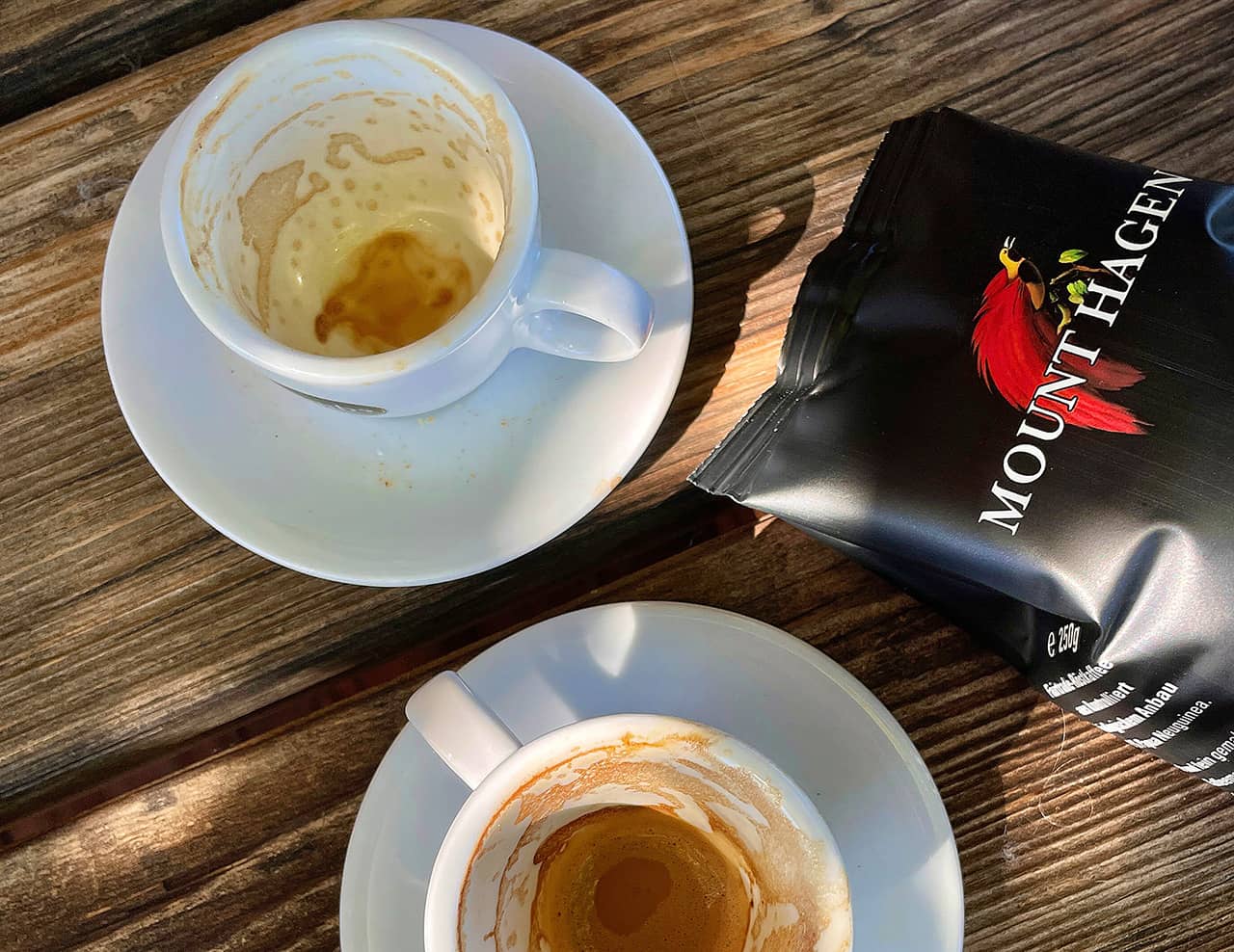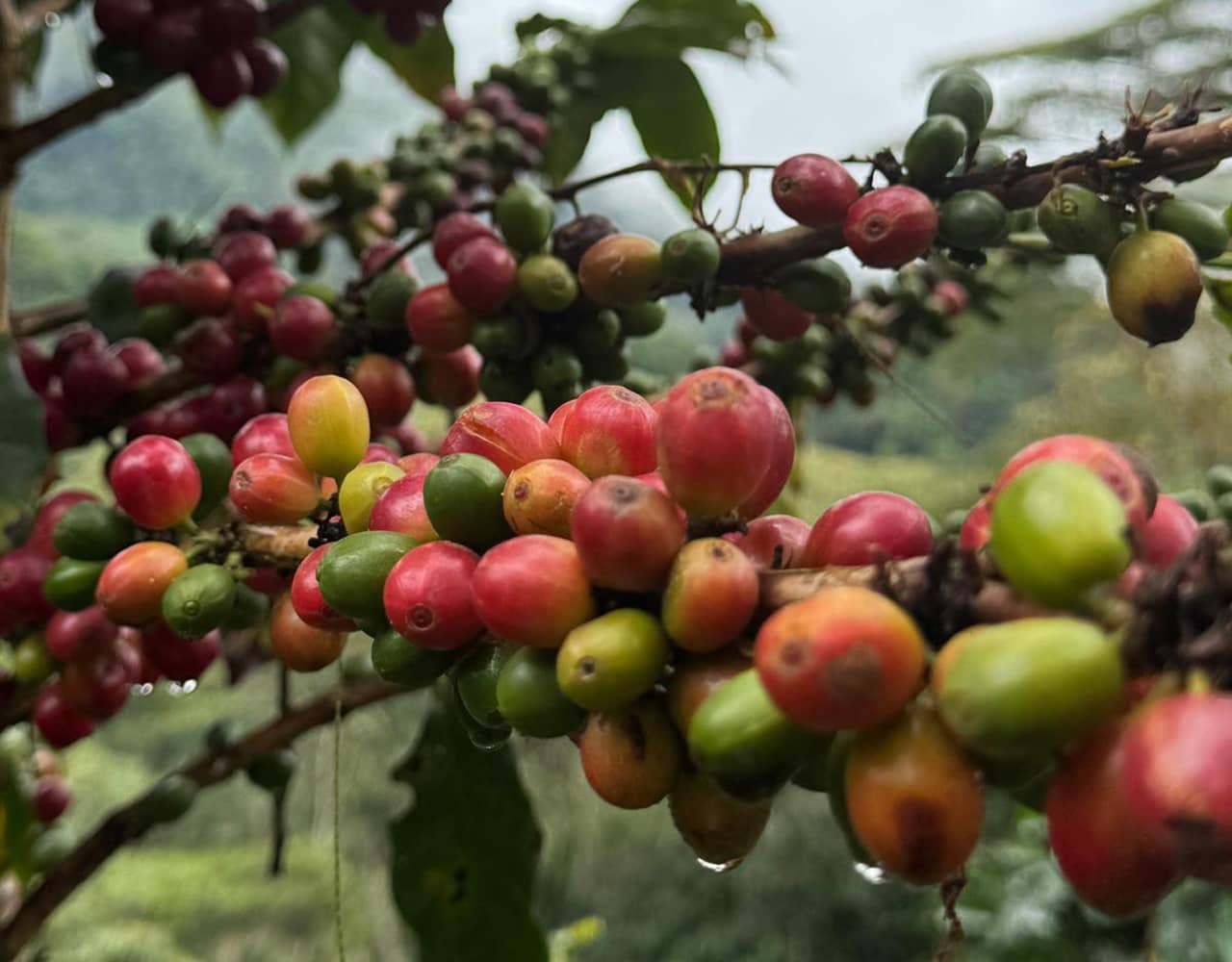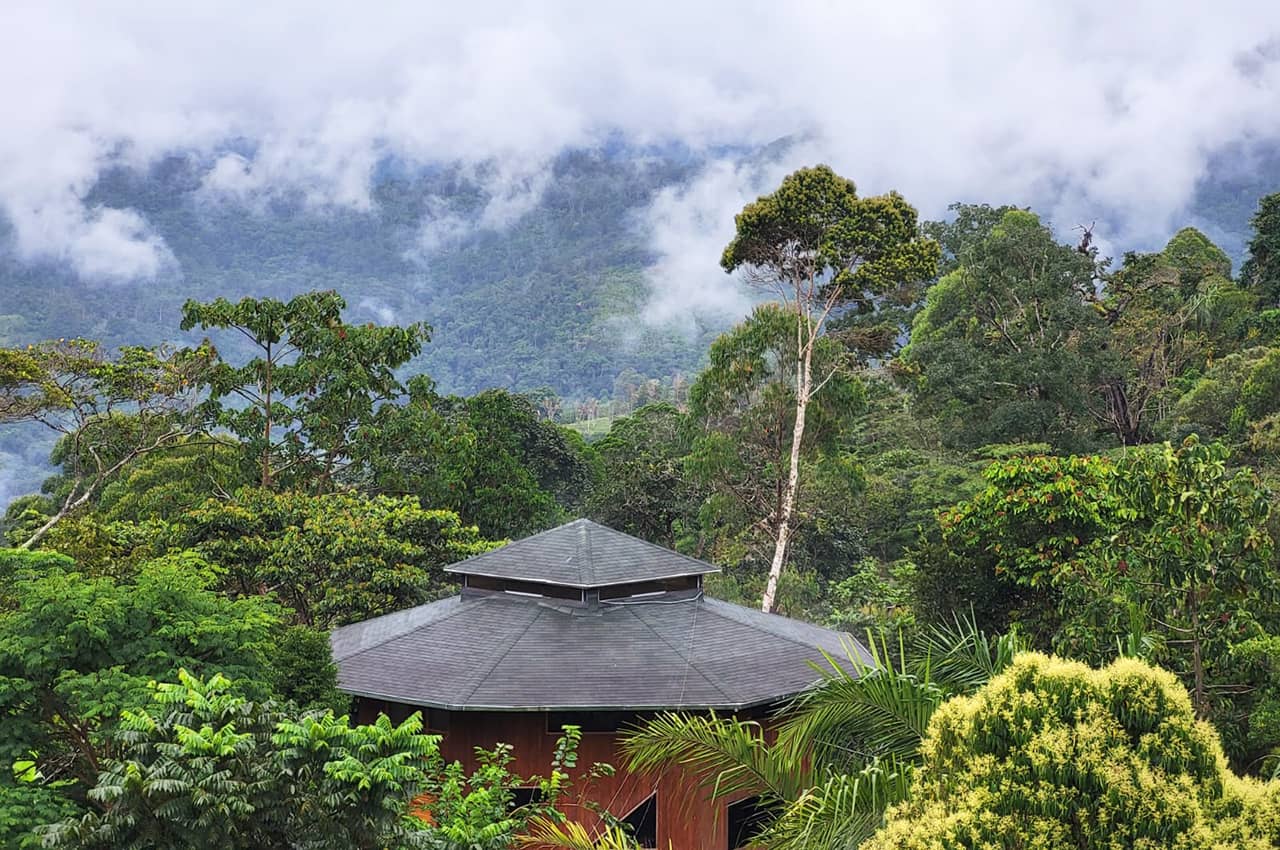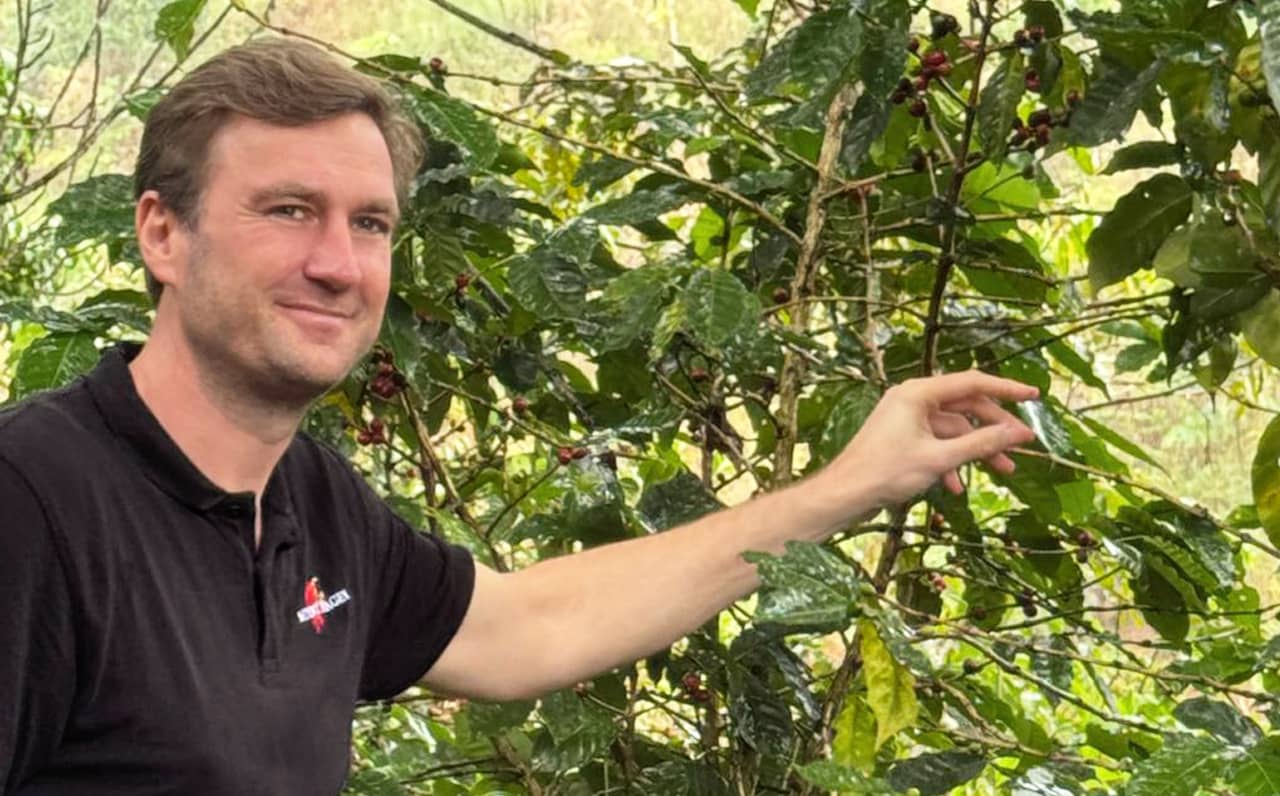- Coffee with
A coffee manin every way.
The topic of generational change in companies – probably one of the most important in Germany at the moment – has also reached Mount Hagen. After almost 30 years, organic pioneer Karsten Suhr is taking his well-deserved retirement and is handing over to his successor Sven Engelmann.

Barbara Beiertz
I had a coffee with him (a single origin from Demeter cultivation in Peru) and talked about his passion – and about footsteps.
BK: Welcome, Mr. Engelmann. My first question – the most important one – is: Which Mount Hagen coffee is your favorite?
SE: (smiles) Our Barista Crema. I really like its full body. And that it is very forgiving. I don’t have a lot of time to make coffee at home – one child is crying while the other one probably just hurt itself. My partner still needs her breakfast. And with the Barista Crema, I always manage to make very, very good coffee.
BK: How would you describe yourself?
SE: I am a coffee man. Coffee is my passion. I learned the business from the ground up. First 10 years – including my studies – at a large roaster in Bremen, where I basically learned everything: What’s going on with the stock markets, the dollar, the Brazilian real, which climatic conditions promote or negatively influence coffee cultivation. During this time, I got to know the peculiarities of the coffee business, especially that it is a very familial business, even within Europe. People know each other, they appreciate each other. It’s an understated industry, which I also really like.
After that, I worked in the big corporate world for a global player in various categories – including chocolate, which is very similar to coffee. And finally, I was able to set up and develop a coffee start-up for the Jacobs family in Bremen. This was the first time I was able to establish contact with farmers – and experience their fears, hardships, and worries first-hand. First and foremost, it is the dependencies: On the stock market and on customers with regard to the purchase of the harvests. The coffee business is always a future business. This means that you are doing business today that will be physically settled in one or even two years’ time. And the farmer does not know how much coffee he will produce because this depends on factors that are beyond his control. At the end of the day, it’s all about building a reliable partnership.
When I met Karsten Suhr he gave me an outline of everything that is done here at Wertform and I recognized a lot of it. 1. From my training company and 2. my previous station. This is a fantastic company with products that you can really identify with.

Organic - thinking outside the box?
BK: What is it like joining an organic company?
SE: Not so different at all. According to my initial findings and the conversations I had at the “Bio-Fach” trade fair a few weeks ago, the organic sector is basically not that different from the conventional sector.
Of course, it is much more driven by thinking about the future. Last week, we developed a vision for Wertform together as a team in a workshop. In addition to organic and fair-trade products, a very important component of it is: How can we create a future worth living? And where can we make a difference?
We at Wertform can exert influence by very consciously sourcing our coffee, not allowing ourselves to be pushed by market pressures, but rather looking at how we can further develop partnerships so that we can both benefit from them. Ecologically, of course, but also economically. Sustainability can only be sustainable if it is also profitable. That is a principle that I have. But to come back to the question of what’s different about the organic sector: It’s simply thinking outside the box.
BK: Most organic companies are the result of a personal motivation, a very personal idea. As a result, they are driven by values rather than numbers. Is that different at Wertform?
SE: Of course, we are focused on taking the organic concept out into the world with our Mount Hagen brand – we now have customers on every continent in the world. On the other hand, we have our private label business, which is also extremely important and vital to our existence. Because we can generate volumes that cannot be achieved overnight in the brand business. Nevertheless, we have very deeply rooted values that we also represent in the private label business. We will never betray our ideology in order to do business.
We solely sell products that are at least certified organic. We are not going to say, “Okay, we are fine with selling a product that is “just” fair trade.” That simply contradicts our claim. Organic is the minimum standard. And we also have fair trade products, Demeter products and Naturland products. I think that we have covered our values quite well. That means sustainable agriculture and fairness. Do the people in the country of cultivation receive a reasonable wage for their work? Is the product also reasonably valued or is it all about dumping? We are very keen to take a holistic view of everything. Not just from the ecological side, but also from the economic side – and not just for us, but also for the farmers at the origin.
Children change the perspective.
BK: What was your motivation to join Wertform? Does it have anything to do with your children?
SE: Yes, that was actually one of the reasons. It’s always like that in life: When you have children your perspective on everything changes a little. My partner was pregnant with our son. Of course, I asked myself a few more questions, for example: What about the Paris Agreement, from which the United States will withdraw again if Donald Trump is president? What can I do to leave my children a green planet?
Wertform made it clear to me in the very first conversations that they are very principled – and not opportunistic. There are many companies that are not able to do that due to existential needs. That does not apply to us. That’s quite charming. We can remain true to our own values here – economically and ecologically.
But of course, my private life also plays a role. My shopping habits have changed a lot since I’ve been here. I hardly ever put conventional products in my shopping cart anymore. Where I shop has also changed: I actually tend to go to organic markets. Because I have just learned from my colleague Martina Jürgs: What does organic actually mean? How much effort goes into it? And how can we motivate our farmers – especially at this stock market level – to continue growing organic? At the moment, the high minimum prices would make it much easier to grow conventional produce, and the earnings wouldn’t even be worse.
We invest in the farmers.
BK: What do you want to do to keep organic coffee farmers on board with organic farming?
SE: I think the most important thing is to give people the assurance that we are there. And that we are also willing to pay a significant premium for the products – if they put in the effort and continue to have the products certified. Coffee is incredibly finance-intensive. This means, that if we sign contracts today that will be delivered in a year’s time, then something will happen during that time. That’s why we invest a lot here and take on the pre-financing. We provide the farmers and cooperatives with money in advance so that they can do their work.
Purchase guarantees and pre-financing are very important drivers to keep farmers on board. After all, they also want to feed their families. They also have to make sure that they keep their business running. If farmers have to borrow money from banks, they pay between 10 and 20 percent interest in the countries of origin because it is an incredibly risky business. We are already covering a lot.
And we also have a fantastic project in Peru, for example (where the coffee we are currently drinking comes from), together with a customer, where we make donations per kilo of coffee. These go towards very small purchases, e.g. sombreros, sun hats for harvest workers so that they can protect themselves a little better in the fields. These are very small projects that we will now look at to see whether this is the right approach. Or whether it would be better for us to co-finance a school or help with soil cultivation. There are all sorts of possibilities. I would actually like us to even expand our commitment: What can we do in Africa? We are currently considering doing something in East Africa with the Democratic Republic of Congo and Rwanda. The focus here is more on child education and training. This is still much less available in rural regions than in Latin America, for example.

A brief digression about water.
BK: What about water? Coffee and water – always a sensitive topic.
SE: That’s right, processing with water is very intensive. Unfortunately, if you have a washed, processed coffee, you won’t be able to avoid it. That’s why support with the construction of wells, for example, is very helpful. And you can do this relatively easy on the individual farms. But unfortunately, there is little we can do about the water intensity for the coffee product. That is simply the requirement of the product.
In organic and Demeter farming, however, water is used very consciously and in a way that conserves resources. The Demeter farm in Peru, for example, has developed a system that purifies the water after the coffee has been processed. The pH value is brought to a good level and then the water is returned to the cycle.
Even more dramatic than the water situation for coffee over the next 20 years, however, will be the development of cultivation areas. They will decline significantly, halving in size, because the climatic conditions for coffee cultivation will no longer exist. On the other hand, the world’s thirst for coffee is not diminishing. China and India are only just discovering coffee for themselves. This will drive consumption even higher, and then we will have a widening gap between supply and demand. There will be a lot of changes in the price of coffee. This could become very interesting everywhere in Europe.
But I don’t think that’s such a bad thing, because the appreciation of coffee and what’s behind it often falls behind, especially in Germany. We try to counteract this a little with our products. This involves a lot of education: How much effort does it actually take to bring a kilogram of coffee from Latin America or Africa to Europe, to roast it, etc.? That’s what we want to convey. That’s why we have our online presence, for example, where we explain a lot and try to make all of it more accessible.
About mainstream & added value.
BK: Organic has arrived in the mainstream. How do you want to increase the appreciation for coffee, for Mount Hagen?
SE: It’s great that organic is normal. Of course, with Mount Hagen we face the challenge of justifying why our coffee is significantly more expensive than a mainstream plus product that also bears the organic seal. Our task is to explain to consumers what is special about our coffees.
On the one hand, there is the Demeter farm in Peru, which we helped to set up through pre-financing – and also the certification. There is the cooperative in Peru with the individual small projects that I mentioned earlier. On the other hand, there is a relatively anonymous product that also bears an organic label – which is great, I’m not denying that – but where you don’t really know what’s behind it.
We can tell you pretty much everything about our products in a transparent way. For example, the Demeter farmer Cesar: What drives him and his family? Farmers often think in terms of dynasties, i.e. generations. Our aim with the Mount Hagen brand must be: 1. to explain to consumers what the added value is. But 2. also to ensure that Cesar explains to his children that it is great to continue to promote and develop sustainable coffee cultivation.
I think the biggest difference between Mount Hagen and the competition is that we put our heart and soul into our coffee and that we work in a very focused way. And then we also work on a very small scale. So, we really try to look: Where are the connecting points – with the customers and in the origin? How can we ensure that we meet existing demand? Our brand and our products are well received: We need significantly more coffee than we did four or five years ago.
Fortunately, we have the opportunity to continue to develop this carefully through the network we have built up, to bring additional farms on board and to strengthen and expand cooperatives. In addition, we have a diversity of certifications that no one else in Germany has in the coffee sector. Meaning organic, Fairtrade, Naturland, and Demeter.
BK: To summarize: The added value of Mount Hagen lies in its origins, in supporting the farmers there, in organic farming. Now there is a view in the organic sector that organic alone is no longer enough. And neither is what lies behind it. How do you see that?
SE: In the beginning, when organic came about, the association was that an organic product was a high-quality product. Now that organic has entered the mainstream and is increasingly in demand, quality has of course suffered in certain areas. Where should all this raw material suddenly come from?
So, we have to make sure that we reconcile enjoyment, quality, transparency, organic, fairness, and a future worth living. This is precisely the vision that the team has developed for our company. We not only see the need to have certified products, to act sustainably, and to support the origin. We also want to deliver outstanding quality and create moments of pleasure. Because coffee should still taste good. And of course, we want to continue to underline this clearly with the quality we have.
Mount Hagen has its origins in Papua New Guinea. Coffee is grown there, but not that much. We have made it our mission to have our own range of Papua New Guinea coffees that taste very, very special. We are talking about opulent aromas, characteristic coffees. We love that we have a unique selling point here. And our partnerships at the origin help us to have a regular supply of this unique coffee. That gives us a certain exclusivity. I would almost say that there is no one who offers a single origin from Papua New Guinea. Simply because the availability is not there. We are now expecting the fresh harvest from Papua New Guinea in the second half of the year and will expand our range again to significantly strengthen the uniqueness and characteristics of Mount Hagen. Papua New Guinea is and will remain the core of the brand. That makes us unique.

New footprints.
BK: Back to the beginning of our conversation. How do you feel about coming from the “normal” world into such an organic company and following in the footsteps of someone who has shaped it for almost 30 years?
SE: I don’t want to follow in any footsteps. Karsten has built a company here that is second to none. He told me how he started out and delivered just over 200 tons a year. When he was on his way to turn over a package of coffee to the gatekeeper he was jokingly asked whether he was now taking away the day’s production. (laughs) Today, we produce around 7000 tons.
I don’t want to fill his shoes. I want to leave new traces – together with the entire team. And distribute responsibility more widely. Not that much will change. It will just be different. That may sound a bit flat. But the truth is that I want to convey the identification that Karsten has with the brand, which he has also shared with the team, to the outside world. That it’s not Sven who’s at the front now, but the entire team at Wertform. Because the squad is incredibly motivated. They all really enjoy their work. And I want to take advantage of that.
I want us to reach more people with Mount Hagen. I want Mount Hagen to be embedded in the minds of consumers. And I absolutely want us to always remain true to our values and be uncompromising. That sounds a bit harsh now. The bottom line is that I think it may hurt a little in the short term. But I absolutely believe that it will only help the brand and the company in the medium and long term.
BK: What do you mean by “hurt”?
SE: Well, we currently have market levels for coffee that have never been seen before. When I was an apprentice, about 20 years ago, a pound of coffee was about 130 US cents. Today we’re at 400, so we’re talking about three times the price. But the economic situation is tight all over the world. People are looking to cut corners. I don’t know whether we won’t have to record a drop in sales with the new price levels.
But we are well prepared. We have everything we need: If we remain true to ourselves and continue what we are doing, this awareness that Mount Hagen stands for high quality, fair trade, and organic products will win out in the medium and long term. I am convinced of that.


